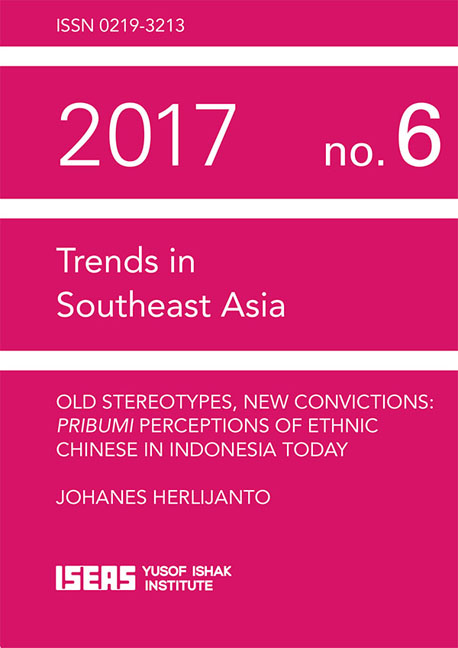Old Stereotypes, New Convictions: Pribumi Perceptions of Ethnic Chinese in Indonesia Today
Published online by Cambridge University Press: 12 March 2019
Summary
INTRODUCTION
On 30 July 2016, a riot took place in Tanjung Balai, a city in Indonesia's North Sumatra Province. It was incited by a protest from an ethnic Chinese woman, who felt that the sound from the loudspeaker of a nearby mosque was too loud and disturbing. Considering her protest to be harassment against their religious practice, Muslims from around the city gathered in front of the woman's house. Unable to attack the house, which was cordoned off by the security forces, the group targeted a number of Chinese and Buddhist temples, and shops, many of which belonged to ethnic Chinese Indonesians.
Leaders in faraway Jakarta responded to the incident in various ways. The general chairperson (Ketua Umum) of Muhammadiyah, one of the largest Islamic organizations in Indonesia, saw the riot as the tip of a “social problem iceberg” caused by a deep socio-economic gap. Similarly, the general chairperson of the Nahdlatul Ulama (NU), another one of the biggest Islamic organizations in the country, pointed to the intellectual, economic, and social gaps within society as the root of the problem. But a more straightforward opinion came from Lieutenant General (Retired) Suryo Prabowo, who asserted that the riot was triggered by the arrogant behaviour of the ethnic Chinese, who dominate the middle and upper middle business sectors, including the property business. His assertion indicates that after two decades of reformasi, negative views of ethnic Chinese persist among important members of the pribumi elite, and the public expression of this has begun taking place more openly in recent years.
This article studies this apparent turnaround in Indonesian public discourse, especially among the pribumi elite eighteen years after the demise of the New Order regime. Inherited from the colonial era, the term “pribumi” refers to hundreds of different ethnic groups whom the Dutch administration subsumed into one category, essentially “the natives”. The pribumi identity became a significant issue in the beginning of the twentieth century when the Indonesian nation was still being constructed. While some of the founding fathers of the nation wished to build a nation to include all who lived in the Netherlands Indies, many others thought that the nation should be exclusively for the pribumi.
- Type
- Chapter
- Information
- Old Stereotypes, New ConvictionsPribumi Perceptions of Ethnic Chinese in Indonesia Today, pp. 1 - 26Publisher: ISEAS–Yusof Ishak InstitutePrint publication year: 2017

